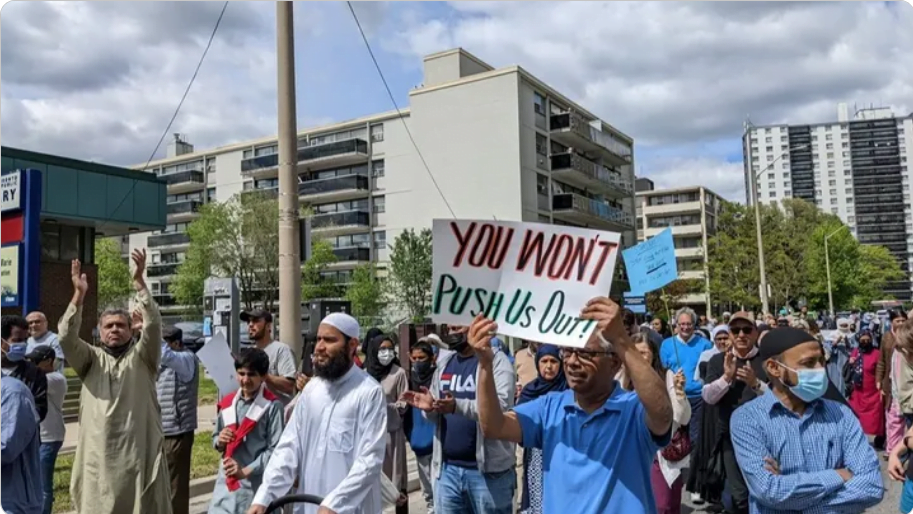On the evening of Sunday, May 1, 2023, tenants at buildings 71, 75, and 79 Thorncliffe Park Drive went on rent strike to try and stop abusive rent hikes. The move came after almost a year of organizing by tenants in response to a 5.5% above guideline increase (AGI) imposed on them by their financial landlords Starlight Investments and the Public Sector Pension Investment Board (PSP).
Starlight, the most notorious among many other major financialized landlords in Ontario pursuing rent increases, has justified the sharp rent increases on the basis of renovations to the buildings. However, Thorncliffe Park (TCP) tenants have noted that the renovations have only occurred in shared and publicly accessible places, such as lobbies, rather than in their apartments. The tenants believe these cosmetic and exterior renovations to be only a pretext to justify drastic rent increases via AGIs on an annual basis, while ignoring the issues tenants face in their units. Some tenants believe that this is a strategy to get rid of the old renters that have been living for years and replace them with tenants who can pay substantially higher rent.
As North Star reported in its March 2023 article on AGIs and evictions, an AGI is an increase in rent above the provincially-set annual rent cap. The Ontario government introduced AGIs through the Residential Tenancies Act in 2006, with the justification that they were supposedly meant to recuperate the costs of added security, increased taxes, or renovations on a landlord's property. In actuality, AGIs are tools "designed for landlords to increase the rent more than what the province would allow" says Kevin LaForest, a lawyer working in Scarborough, Ontario with experience with tenant disputing AGIs.
Tenants can technically attempt to dispute an AGI through the Landlord and Tenant Board (LTB). However, from the moment tenants decide to challenge an AGI, LaForest told North Star that the timeframe for a hearing can be up to two and a half to three years and the best deal tenants can expect is a half percent to one percent off the AGI.
Starlight Investments is one of Canada's largest financialized landlord firms—a privately held investment and asset management company that holds 61,000 units valued at $19 billion CAD. The business model for financialized landlords is to use real-estate and housing as investment vehicles to generate significant profits. And behind Starlight is another financial giant PSP Investments, a government-owned crown corporation that manages the pension funds of federal employees that span the federal public services, the Royal Canadian Mounted Police, the Canadian Armed Forces, and the Reserve Forces.
Latest news gathered by North Star is that Starlight had not responded or engaged the tenants on rent strike, which by June 1 had reached some 200 tenants (up from 120 tenants on May 1). Instead, in May they issued N4 notices—notices to end tenancy for non-payment of rent—for the some 120 tenants who launched the rent strike. Despite N4 notices, a representative from TCP says "we are continuing to our fight to escalate the issue. We do intend to disrupt several upcoming Starlight and PSP events".
Meanwhile in East Scarborough, North Star talked to a tenant in another Starlight-owned (but MetCap managed) building at 25 Cougar Court, where the East Scarborough Tenants Union has also been fighting a 5.5% AGI and which may also lead into another rent strike against Starlight and its associates. An organizer from the East Scarborough Tenant Union told North Star that their research has revealed that the total rent increase tenant face in the coming three years is actually closer to 20%.
On the other side of Toronto, on June 1, another rent strike was launched by the tenants of 25 King St. in the working-class area of Weston. The York South-Weston Tenants Union also declared their rent strike to combat an AGI by their landlord Dream, an international corporate landlord that controls some 30,000 units.
The current two rent strikes in Toronto represent the first since the beginning of the pandemic, when rent strikes developed across the city across a number of neighborhoods, most notably Crescent Town where some 300 tenants went on rent srike in response to the major economic downtown and job losses that came with lockdowns. Today, with the cost of living crisis being stakced on top of a housing crisis and slamming much of the working class and people broadly, it's anyone's guess how many more rent strikes Toronto and Ontario will see in the coming months and years.


